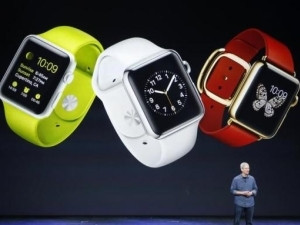
Apple has debuted its first totally new product since the introduction of the iPad - which essentially created the tablet market - five years ago, but analysts are sceptical about the ability of the company's smartwatch to meaningfully impact South African society.
Apple officially launched the latest addition to its product portfolio - the Apple Watch - on Monday at the company's Spring Forward event. This came exactly six months after CEO Tim Cook first took the wraps off the wearable smart device in a move that marked a "me too" direction - but with Apple's characteristic premium mark.
Whereas the iPad created a new consumer electronics category, while becoming an education enabler and alternative, compact business tool - the Apple Watch falls far short in potential and is likely to remain a "nice to have" for the foreseeable future.
This is perhaps truest in emerging markets like SA, say analysts, where there is considerable polarisation in living standards measurement (LSM) groups, creating a division of needs and in priorities.
Apple expects its watch to appeal to millions, despite the usual hefty Apple price tag. The Apple Watch sport will start at $349 for the smaller, 38mm model. The standard version of the watch will start at $549 and the high-end "Edition" watch will be priced from $10 000, according to Cook.
Limited use case
World Wide Worx MD Arthur Goldstuck says, as with the smartphone and tablet, SA will certainly see cheap alternatives of smartwatches emerge, but notes the lower you go down the value chain, the less reason you can give people to use a smartphone.
"By that I mean the upper end of the market that will pay more than $350 for a device that will be obsolete in a year or two has image and status needs that are very different to those at the lower end of the value chain."
For now, says Goldstuck, the smartwatch in general is largely a convenient interface to a smartphone, an accessory rather than a tool in its own right. "Until it becomes a standalone computer in its own right and can project both keyboard and display onto other surfaces, it can't be compared to tablets in terms of potential."
He says, as far as educational uses go, the smartwatch has little benefit aside from alerting students that it is time to go to class, or alerting teachers that the class has ended. ICT expert Adrian Schofield adds, at this stage of the game, the smartwatch is not an educational tool in the way that tablets are. "The form factor is inappropriate for that purpose."
Apple appeal
But if anyone can redefine the smartwatch, it is Apple, says BMI-TechKnowledge analyst Clinton Jacobs.
And, as far as the upper LSM market goes, analysts are optimistic about the chances of Apple's success. Goldstuck notes the company's brand and the appeal of its watch design is the key to it being more successful than competing smartwatches.
Should a war of the watches emerge in SA, he believes Samsung, Sony and Apple will be the three main rivals. "Samsung and Sony already have their products in the market, both have gone through several generations of experimentation and improvement, and Sony in particular has crossed the bridge between smartwatch and activity monitor quite effectively. Apple already has a captive audience of Apple believers who want it because it's Apple."
Jacobs says Apple has redefined the music player and tablet market, while integration between its devices is always good.
Schofield says Apple has a great track record and the Apple Watch will be immediately desirable to the millions who love the brand - although the $10 000 version with the sapphire glass is probably outside the budget of most.
"I understand the $349 model to be rather basic, so the mass market should be going for the $549 model. At about R7 000, it's not outrageous for a status symbol."
Share